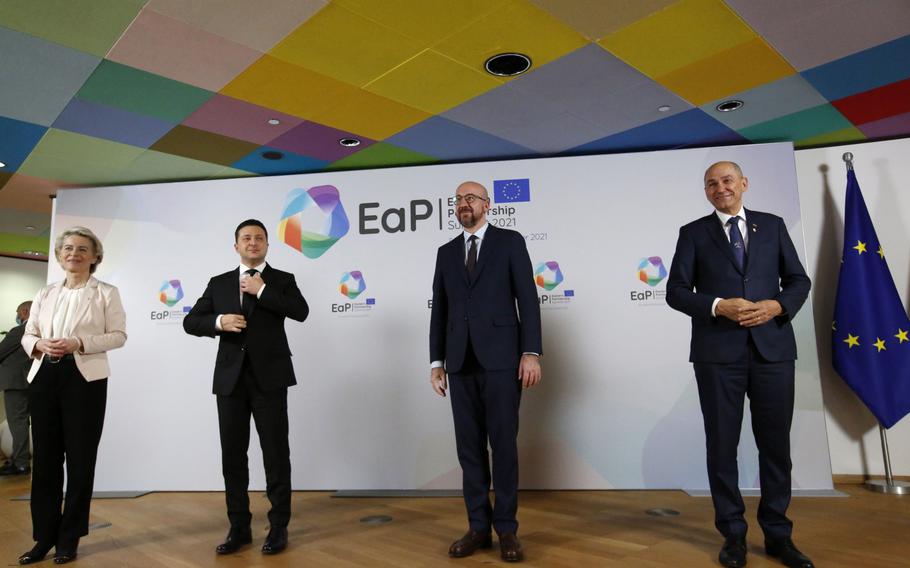Europe
Big EU states resist push for fast Russia sanctions over Ukraine
Bloomberg December 15, 2021

Ursula von der Leyen, president of the European Commission, left, Volodymyr Zelenskyy, Ukraine’s prime minister, second left, Charles Michel, president of the European Council, third left, and Janez Jansa, Slovenia’s prime minister, pose for a photo on the sidelines of the Eastern Partnership Summit at the Europa building in Brussels on Dec. 15, 2021. (Valeria Mongelli/Bloomberg)
Leading nations of the European Union are resisting a push to quickly draw up specific sanctions and other punishments to impose on Russia if it invades Ukraine, even as the Kremlin shows no sign of backing off a massive troop buildup near its neighbor.
Germany, France, Italy and Spain want to focus now on talking to Moscow before laying out details of painful economic measures they would trigger. But other member states argue that backing up the public threats of sanctions would better deter Russian President Vladimir Putin, according to senior diplomats and officials who spoke on condition of anonymity.
The divisions underline the challenges the U.S. and its allies face in mounting a coordinated response to prevent Russia from mounting an attack. They also reflect skepticism in some European capitals about Washington’s warnings over the last few weeks that Russia is actually preparing for a major assault on Ukraine and not simply using the troop buildup as a bargaining chip to win concessions.
“We want to be on this prevention-mode, that is the work of diplomacy, to try to study the different scenarios to have an answer prepared for each one of them, and making clear there will be an answer for any one of them if they happen,” EU foreign policy chief Josep Borrell told lawmakers in Strasbourg on Tuesday. EU leaders will discuss the issue in Brussels during two days of summits and bilateral meetings, including with Ukrainian President Volodymyr Zelenskiy, on Wednesday and Thursday.
A string of western leaders, including U.S. President Joe Biden, French President Emmanuel Macron and German Chancellor Olaf Scholz have spoken to Putin in recent days to deliver the message that the West would impose much harsher sanctions that it has in years in the event of a Russian invasion. Those could include moves to cut big Russian banks off from the western financial system, as well as potentially a commitment by Germany not to bring the Nord Stream 2 gas pipeline from Russia into service, according to people familiar with the plans.
The European Commission already has a draft available for discussion, according to a senior EU official, but it is being held back because of concerns including member states objecting to specifics. The paper details various options for a reaction depending on what Russia does, with scenarios including a hybrid attack and cyber warfare, as well as a military offensive, the official said.
But Germany believes that approach would leave no stick against Russia for the future because the draft would leak, the official said. Like-minded nations argue releasing an options paper would give Putin the fight he’s looking for, and that anything that hurts Russia could well affect EU member states given their close economic ties.
They contend that waiting for Putin to move before reacting forcefully with a concrete, tailor-made response would be more effective than putting various options on the table too early with the risk some may not be used, according to senior EU officials. They underline that there’s no doubt there would be painful measures imposed in the event of invasion, but there’s debate on how detailed the planning should be in advance given the uncertainty about Putin’s intentions.
The caution on the part of several EU nations also reflects the fact that some members of the bloc do not share Washington’s conviction that Putin could be planning an invasion, possibly as soon as early next year. Instead, they see Putin using the troop buildup as a pressure tactic, pointing to his success in sparking an offer of talks from Biden that may lead to concessions, a diplomat said.
In a call Dec. 7, the U.S. president agreed to begin discussions on Putin’s demand for binding security guarantees that would prevent the North Atlantic Treaty Organization from adding new members in the East or deploying weapons there that Moscow deems threatening. A U.S. diplomat is in Moscow Wednesday discussing Russia’s concerns.
The White House has ruled out giving in to Moscow’s demands and Biden spoke to leaders in the region after his call with Putin. His comments helped assuage fears in the region that Washington might agree to terms that could compromise security there, according to a senior East European official.
The Kremlin denies it plans to invade but accuses Kyiv of sabotaging a 2015 peace agreement and planning military action against Russian-backed separatists in east Ukraine. Kyiv denies those allegations.
The troop buildup shows no sign of abating, U.S. and European officials said. About 100,000 troops are in place near the border, along with thousands of tanks and other pieces of equipment.
For the EU, ahead lies a long and difficult discussion on how to deal with Russia over the build-up and any future moves, two EU ambassadors said.
Bloomberg’s Stephanie Bodoni, Daryna Krasnolutska and Richard Bravo contributed to this report.